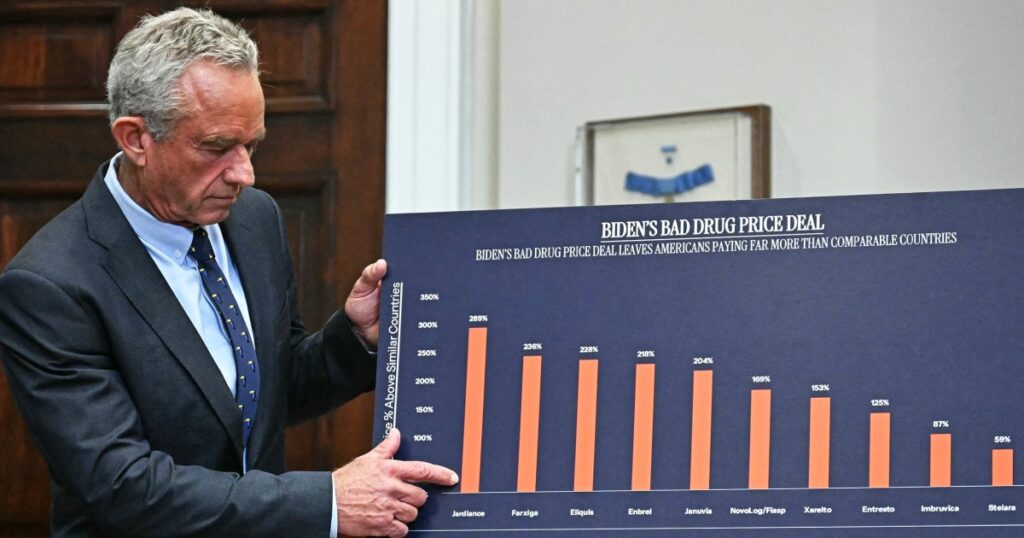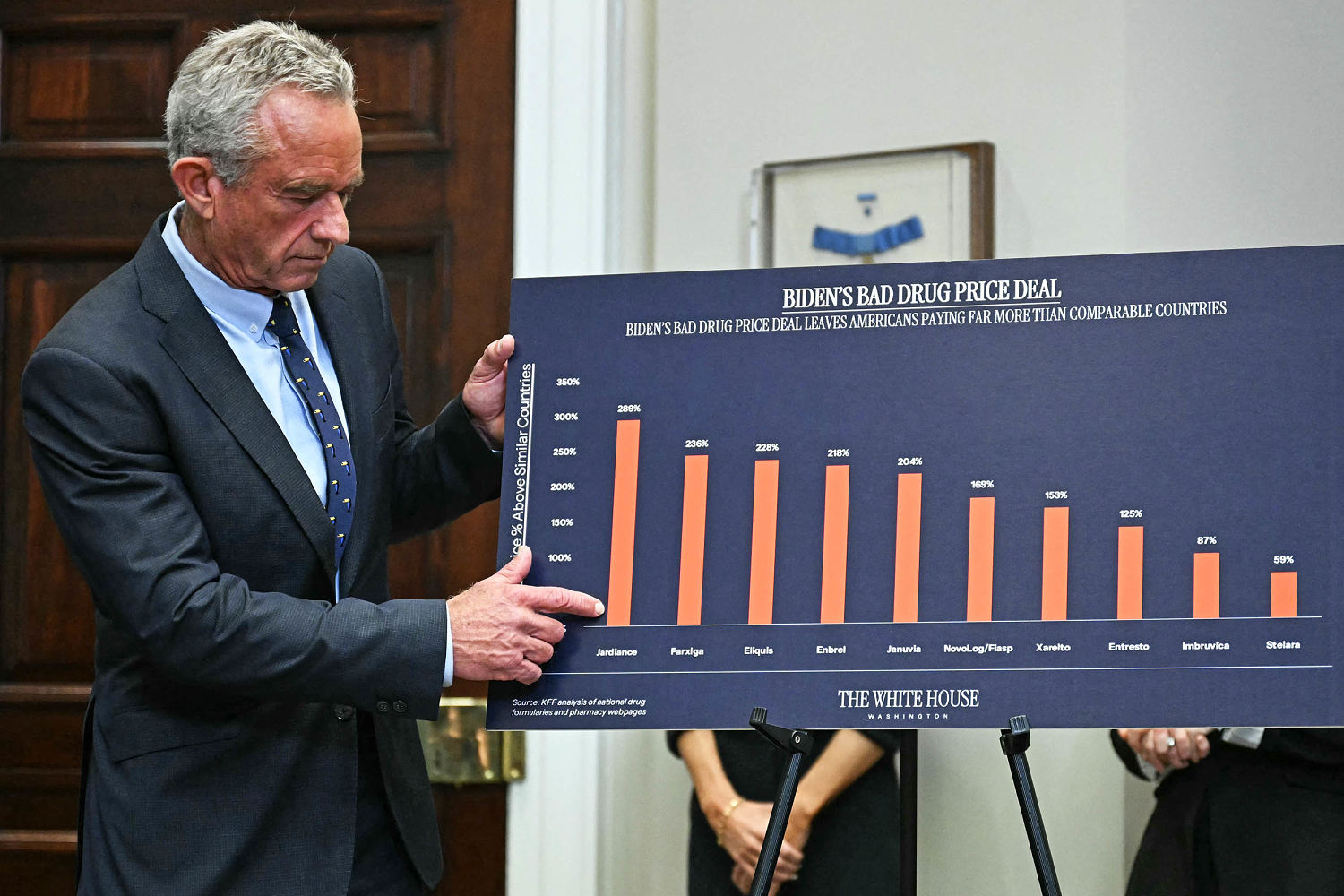

President Donald Trump signed a sweeping executive order Monday that aims to cut prescription drug costs in the U.S. by aligning what the government pays for certain medications to the prices paid in other countries.
The order, experts say, is a reimagined and far more aggressive version of Trump’s policy during his first term to cut drug costs, which failed to take effect after a federal judge blocked it.
Like the original policy, health policy experts expect it will meet significant pushback from the drug industry.
The new order directs Health and Human Services Secretary Robert F. Kennedy Jr. to come up with price-cutting goals within 30 days, White House officials said on a call Monday. The move will kick off a round of negotiations between Kennedy and the drug industry.
Should talks stall, Kennedy will move to enforce the “most favored nation” pricing model, capping the U.S. prices at the lowest rates paid by other wealthy nations.
Most notably, officials said the policy will not be limited to certain drugs under Medicare, as it was in original version, but will also target medications covered by Medicaid and private insurance.
“I’m doing this for the American people,” Trump said at the White House discussing the executive order. “I’m doing this against the most powerful lobby in the world probably, the drug lobby.”
Weight-loss drugs expected to be targeted
The administration hasn’t singled out a specific class of drugs for price cuts, but officials said it’s fair to expect that GLP-1s — a class of drugs that includes Ozempic, Wegovy and Zepbound — will be included among them. Last month, the administration rejected a Biden-era proposal for Medicare to cover weight loss drugs. The move would have saved patients money but cost the government about $25 billion over 10 years.
The Food and Drug Administration will also consider expanding the importation of prescription drugs from countries beyond Canada, where prices are often cheaper than in the U.S, officials said, and the Department of Justice and the Federal Trade Commission will be directed to act against “anti-competitive” actions by drugmakers that they say keep drug prices high.
Prescription drug prices are notoriously high in the U.S. Although the country makes up less than 5% of the global population, it accounts for nearly three-quarters of global pharmaceutical profits, officials said Monday. According to the Rand Corporation, a public policy think tank, Americans pay up to 10 times more for medications than people in other similarly wealthy nations.
The U.S. spends $1,126 per capita on drugs, a fifth of what Britain spends, Kennedy said, adding that the U.S. is no longer “subsidizing” other countries. Americans often pay more than other nations, helping drugmakers recoup on research and development costs.
Will the drug pricing plan work?
While experts backed Trump’s approach, they questioned how the administration would legally pursue price reductions for drugs under private insurance. They also worried about its ability to withstand legal pushback from the drug industry.
“If this touches all drugs for all people, it’s far more ambitious, but the ripple effects are far more uncertain,” said Tricia Neuman, executive director for the program on Medicare policy at KFF, a health policy research group. “I would expect the drug industry to throw every legal argument at this proposal.”
Arthur Caplan, the head of the medical ethics division at NYU Langone Medical Center in New York City, said the administration may need to set more realistic expectations for what it can achieve.
In a Truth Social post on Sunday, Trump claimed that prescription drug costs would be reduced “almost immediately” by 30% to 80% and that the U.S. “will pay the same price as the Nation that pays the lowest price anywhere in the World.”
In a follow-up post Monday, Trump said drug prices would be cut by 59%. At the White House later Monday, Trump claimed drug prices would be reduced by 50% to 90%.
Caplan said immediate relief would be great — but argued it’s impossible for the U.S. to achieve the lowest prices in the world.
“We are not going to get the price paid by South Africa, Peru, Egypt, Bolivia and Laos,” Caplan said. “Drug companies usually give whopping discounts to very poor countries on humanitarian grounds they won’t give rich countries. The prices paid in the poorest nations have no chance of being the price paid by the Trump administration.”
Stacie Dusetzina, a health policy professor at Vanderbilt University in Nashville, Tennessee, worried the policy might harm doctors and pharmacies if the price cuts were immediate.
“For retail pharmacies or clinician administered drugs, they buy their drugs ahead of time to stock the shelves or have them available to treat patients,” she said. “What the pharmacy or clinic paid to acquire their drugs is likely higher than the proposed new price, which means they would lose money when those drugs were filled.”
On Monday’s call, an official appeared to clarify Trump’s Sunday remarks, saying that drugmakers are expected to be “coming to the table very soon” and that the administration anticipates “action” and “relief very soon.”
Officials didn’t say how this would affect the ongoing Medicare drug pricing negotiations, a policy signed into law by President Joe Biden through the Inflation Reduction Act.
In the final days of the Biden administration, the Centers for Medicare and Medicaid Services announced the next round of drugs up for price negotiations. The first round of negotiations is estimated to save Medicare $6 billion in 2026, when the prices go into effect.
But officials argued that the lower prices achieved through the Biden administration were “inadequate” and that Trump’s new policy would achieve more aggressive price cuts.
“We’ll be taking action to go beyond what was achieved under the Inflation Reduction Act,” an official said.
The Pharmaceutical Research and Manufacturers of America, a drug industry trade group that filed a lawsuit against Trump’s original policy, did not immediately respond to a request for comment.
In a statement last week, Alex Schriver, a spokesperson for the group, said the Trump administration should instead focus on so-called pharmacy benefit managers (PBMs) to address high drug costs.
PBMs, also known as middlemen, work with insurance companies to negotiate discounted prices from drug companies in exchange for including the drugs in their coverage. In theory, PBMs are supposed to save patients money, but they’ve been the target of U.S. lawmakers after government findings accused them of inflating the price of drugs.
 Latest World Breaking News Online News Portal
Latest World Breaking News Online News Portal






